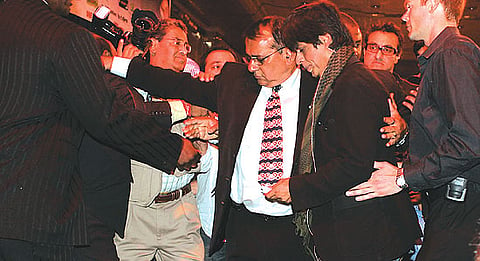Sand Niggers
South Asians are often subject to random and special racial profiling at US airports
- Primary Inspection: Foreign travellers arriving in the US furnish travel documents to the US Customs and Border Protection (CBP) officer. He then decides on the foreigner’s duration of stay.
- Secondary Screening: If the CBP officer has doubts on the traveller’s identity, he’s screened again. Could last for hours, entails intrusive body and baggage searches, extensive questioning, and copying of information data in the traveller’s possession.
- Secondary screening is also done if the traveller’s name matches those on the US government’s terrorist watch list. Carried out under the aegis of the Terrorist Screening Centre, which is administered by the FBI and dept of justice.
- Two categories on the watch list: No fly, for people who are prohibited from boarding an aircraft; and Selectee, for those who must undergo secondary screening before they can be allowed to fly.
***
Kavneet isn’t an exception. The Asian Law Caucus, a San Francisco-based legal and civil rights group, has a report (‘Returning Home: How US Government Practices Undermine Civil Rights at our Nation’s Doorstep’) packed with examples of people who have suffered humiliating interrogation by US Customs and Border Protection (CBP) officers. Amir Khan, an American IT consultant originally from Pakistan, was interrogated for a total of almost 20 hours after five international trips. He was asked about his religion, whether he hated the US government, and whether he had visited mosques, and was even told he should “pray more”. CBP agents inspected Amir’s laptop, examined the books in his luggage and recorded information on a book on the history of Islam, the report notes.
What Kavneet and Amir have in common is their South Asian heritage and names that, post-9/11, evoke suspicion, fear and at times intense rage among some Americans. In fact, what Shahrukh experienced during his detention for “secondary screening” at Newark’s Liberty International Airport was tame in comparison to what people of South Asian or Arab descent are often subject to on their travels across the US.
Veena Dubal, a civil rights attorney at the Asian Law Caucus, says the experiences of many of her clients make Shahrukh’s almost pleasant in comparison. Not only were they questioned for hours, many of Dubal’s clients have had their cellphones, cameras, and laptops confiscated and copied. “They are asked questions such as ‘where do you pray’ and ‘what do you think of the war in Iraq’—questions completely unrelated to the admissibility of an individual,” she says.
Ultimately, it’s racial profiling. Individuals born in particular countries, regardless of their American citizenship, with names that indicate a Muslim background, and who “look Muslim”, are pulled aside for “secondary inspection” and subject to hours of intrusive questioning and extensive searches. “In America, ‘looking Muslim’ means having brown skin,” Dubal contends.

CBP spokesman Kevin Corsaro says Shahrukh’s “secondary inspection”, which lasted for approximately an hour, was delayed because the airline had misplaced his luggage. “Once the CBP was satisfied, he was released,” points out Corsaro. Deepa Iyer, executive director of South Asian Americans Leading Together, a non-profit organisation that addresses civil and immigrant rights issues, says Shahrukh’s experience was only unusual because of the headlines it naturally managed to generate. “Not everyone can call someone important and get released,” she says, referring to the phone call the actor made to Congress leader Rajiv Shukla for succour.
Those arriving in the US must go through “primary inspection”, which entails furnishing entry documents—passports and visas—to the CBP officer. If the officer has reason to doubt the traveller’s identity, the traveller is asked to proceed for “secondary screening”—which is intrusive and could last several hours. Travellers are also subject to secondary screening if their names are found to match those on the US government’s terrorist watch list, the contents of which are kept secret. Corsaro declined to say whether Shahrukh’s name matched one on the list.
Rajdeep Singh Jolly, legal director at SALDEF, says at some US airports Sikhs can expect secondary screening a 100 per cent everytime. “Our concern is that the burden of secondary screening is not being shared equally by all travellers,” says Jolly. True, travellers can file complaints if they feel they have been unfairly targeted. But this is seldom done. “People don’t know what their rights are and don’t know when these are being violated,” says Iyer.
But it’s not just South Asians who are routinely profiled. African American drivers are inexplicably pulled over by police so frequently that the phenomenon has earned the self-deprecating sobriquet “driving while black”. Post-9/11, Arabs became targets. And Latinos are often suspected of travelling without proper documents.
In this steady pattern of discrimination, Walter Ladwig’s experience sticks out. The American PhD student at Oxford University, who frequently travels to Washington, was flying to the US capital after visiting his wife’s family in rural Kansas. At the airport in Greater Bend, Kansas, Ladwig was informed he had been “randomly selected” for additional screening. “They then proceeded to give me the full pat down, wand and go through my luggage,” Ladwig recalled. Here’s the kicker: Ladwig was the only passenger boarding the plane that day! “Perhaps a 6’3” blue-eyed white guy is a ‘safe’ choice to ‘randomly’ select? What kind of discrimination am I going to complain about?” Ladwig joked.
Dubal says the way the US government treats travellers of South Asian, Muslim or Arab origin at the border counteracts President Barack Obama’s efforts to improve relations between his country and the rest of the world. “Profiling stands in opposition to the values the US is supposed to stand for,” she says.
Tags